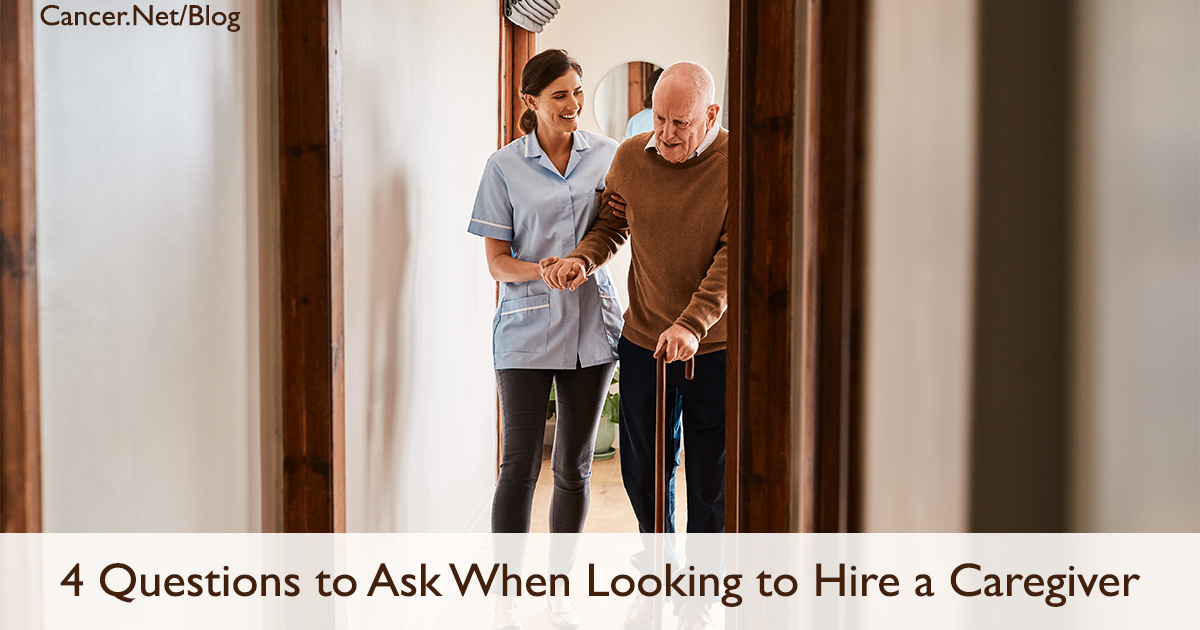
Caregivers play an important role in helping people with cancer during treatment, recovery, and beyond. Longer-term caregiving may be especially necessary for people who have advanced cancer or late or long-term effects from cancer treatment. For some people with cancer, a spouse, child, sibling, or friend can step into a caregiver role to help with daily needs and activities. But other times, you may need to hire a caregiver. For example, you may not have family in town to help with caregiving, or you may need specific medical care from a skilled nurse. You may also need to hire a caregiver to give your regular caregiver a break, called respite care.
Finding a caregiver is personal. You are inviting someone into your home to care for you or your loved one. There are also finances and logistics to consider. Insurance may cover some or all of the costs related to hiring a caregiver, but some plans may not. It is important to find what’s covered and what’s not in advance.
There are specific caregiving resources available for people with cancer. Home health agencies, for example, employ a staff of caregivers available for hire, including nurses and home helpers. Registries or staffing services can also help you hire caregivers. Or, you can directly hire independent contractors as caregivers. Below are some questions to consider as you start looking for caregiving help.
1. What kind of care do I need?
First, try to define and anticipate what type of care you may need. For example, you may need a nurse to help you at home after chemotherapy or surgery. Talk with your health care team about what type of caregiving to plan for during the course of your treatment and recovery. Consider asking your health care team these questions:
-
How long after my surgery or treatment can I return home?
-
Will I need medical help at home after my surgery or treatment?
-
What type of help will I need, and how long will I need it for?
-
Will I need help with personal tasks, like taking a shower or getting dressed?
-
Will I feel too tired to do my usual chores, like cooking, cleaning, laundry, and errands?
Other times, you hire a caregiver because you need extra help around the house or your regular caregiver needs a break. Ask yourself or your loved one these questions:
-
Do I need additional emotional support or counseling?
-
Are personal or household tasks difficult to do on my own?
-
Do I need help organizing my appointments or paying bills?
-
Do I need help organizing my caregivers or caregiving tasks?
2. What type of caregiver should I hire?
There are several types of caregivers that people with cancer may rely on when they need help at home.
A registered nurse, or RN, gives direct medical care. An RN has a degree in nursing and has passed an exam and licensing program in their state. A licensed practical nurse, or LPN, provides basic medical treatment at home, including giving medications and changing bandages. Each state has its own licensing program for skilled nurses.
A certified nursing assistant helps with health care and daily needs, working under the supervision of an LPN or RN. They are also called nursing assistants, patient care assistants, or nurse aides. A home health aide or personal care aide helps with daily care like bathing, dressing, and cooking, as well as with basic health care monitoring. Training and certification vary by state.
Several other helpers can fulfill other needs, including housekeeping or companionship. They can be hired through a local home health agency or work on their own, independent of an agency or company.
3. How do I find a trusted caregiver to hire for myself or a loved one?
Home health agencies staff different types of caregivers, from nurses to therapists to home health aides. The agency screens, hires, and supervises each caregiver. The agency also pays the caregiver’s salary and covers liability for care. They do much of the work in finding licensed, reliable professionals.
Ask your health care team for a referral to a local home health care agency. You can also ask your local hospital about home health care agencies near you. Even if you do not have Medicare, you can use the Medicare.gov home health agency finder to start your search. Or, you can contact your state’s department of health or social services for a list of licensed home health agencies.
Registries or staffing services match patients with caregivers and often collect a fee for doing so. Then, after hiring a caregiver, you will cover the caregiver’s salary and other fees.
You can also hire a caregiver on your own. Online tools and apps have made hiring independent contractors easier than ever, and it can be less expensive than going through an agency. However, it does come with risks, and it will take more work and time to screen, hire, and supervise these caregivers. Personal recommendations are often helpful if you choose to hire a caregiver on your own. Ask friends and family members if they have any recommendations.
4. What should I look for when hiring a caregiver?
If you use an agency, much of the work involved with finding, screening, and hiring a caregiver is done for you. Oftentimes, an agency has a representative who will come to your house and ask you about your care needs. Be sure to share with them what a typical day looks like for you and the information your health care team has provided about the care you’ll need. It may be helpful to write it out in advance, so you don’t have to try to think of everything at the last minute. Also, think about whether you need someone for just a couple of hours per day or if you need help around the clock. Consider your finances in advance, in case you will need to cover some expenses yourself.
If you use a staffing service or hire someone on your own, it can be helpful to write a job description, have a brief phone interview, and then an in-person interview. During the phone interview, ask for references and their phone numbers. Call the references before you invite the person to your home for an in-person interview. Make a list of questions about the reference’s experience working with the applicant and ask if there were ever any red flags in working with that person.
In your job description, be clear about the training required. If you’re hiring an RN or LPN, make sure their licenses and state certification are up to date by checking with your state’s board of nursing. Certified nursing assistants and home health aides must also meet certain training and certification requirements.
Be honest and upfront with potential caregivers about what you need their assistance with, such as helping you into the shower or help using the bathroom. Ask whether the applicant is willing and able to help with those duties. You should also look for a caregiver who is available during your ideal hours or days and who has experience providing the kind of care that you need.
During an in-person interview, look for attributes that you value, such as being compassionate or listening closely. Was the person on time for the interview? Did the person seem engaged? Did they ask any questions and seem interested in you or your loved one’s overall well-being? Would you want to spend time with that person? Would you be comfortable giving them a key to your home, if necessary?
Here are some additional questions to consider asking a potential caregiver, depending on you or your loved one’s needs. You can ask these questions regardless of whether or not the potential caregiver has nursing experience:
-
Are you comfortable giving medications?
-
Will you be able to help with preparing and cooking meals?
-
Are you comfortable doing household tasks and cleaning?
-
Do you have your own vehicle, or would you need to take public transportation or have someone else drive you?
-
Are you able to run errands, such as picking up prescriptions and groceries? Can you drive me or my loved one to medical appointments?
-
Are you able to commit to the hours we discussed?
-
If insurance does not cover these costs, what is your hourly rate of pay?
Finally, trust your instincts and continue to evaluate that person once you have hired them. Caregiving takes knowledge and compassion, so always remember there are people who can help.







